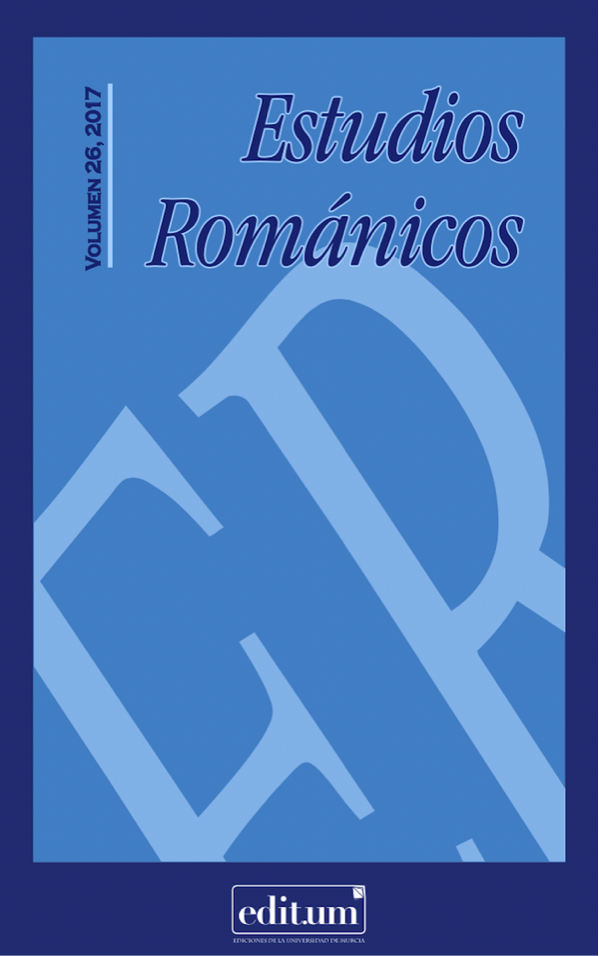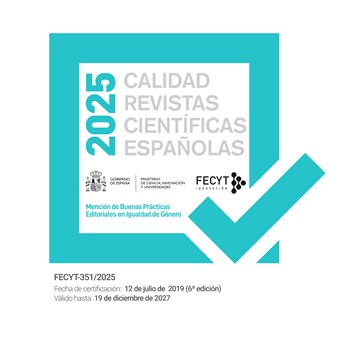The use of German language and Latin language in Germany at the time of the renaissance Humanism
Abstract
During the Renaissance humanism in Germany there existed an outstand- ing linguistic diversity that contributed to its linguistic cultural heritage, even though that the hegemonic use of the Latin language at schools, at the universities, in the political life and at every institution in general, reduced the use of the German language. This situation explains that Latin was the linguistic instrument used by German humanists, since the own concept of humanism includes such adoption; however, not all German humanists used that language exclusively, some of them employed simultaneously both languages, German and Latin, what favored the richness and linguistic diversity of Germany at this time.
Downloads
-
Abstract801
-
PDF766
-
PDF (Español (España))766
References
ARIAS MONTANO, B. y GALLE, Ph. (2005): Virorum doctorum de disciplinis benemerentium effigies XLIIII. [Cuarenta y cuatro retratos de sabios beneméritos en las artes liberales], Luis Gómez Canseco, L. y Navarro Antolín, Fernando (eds.). Huelva: Universidad de Huelva.
BATAILLON, M. (1983): Erasmo y el Erasmismo. Barcelona: Editorial Crítica. ESTEBAN, L. (1997): (ed.), Cuatro estudios a una obra o el “Arte de Enseñar” de Juan Luis Vives. Valencia: Ayuntament de Valencia.
FONTÁN, A. (1992): Juan Luis Vives (1492-1540). Humanista. Filósofo. Político. Valencia: Ajuntament de València.
GARCÍA-VILLOSLADA, R. (1971): Martín Lutero. Vol. II: En lucha contra Roma. Madrid: Biblioteca de Autores Cristianos (B.A.C.).
GRANE, L. (1975): Modus Loquendi Theologicus. Luthers Kampf um die Erneuerung der Theologie (1515-1518). Leiden: E. J. Brill.
HALKIN, L-E. (1971): Erasmo. México: Fondo de Cultura Económica.
JANSSEN, J. (1925): Historia Universal. Vol. VIII bis: La cultura alemana antes y después de Lutero. Barcelona: Librería Religiosa.
LABRADOR, C. (1984): “Felipe Melanchton, iniciador de la segunda enseñanza humanística”. Revista Miscelánea Comillas. Vol. 42: 17-36.
LILJE, H. (1986): Lutero. Barcelona: Salvat Editores.
LUTERO, M. (2006): Obras. Edición preparada por T. Egido. Salamanca: Ediciones Sígueme.
MACK, P. (1993): Renaissance argument. Valla and Agricola in the traditions of rethoric and dialectic. Leiden (The Netherlands): E. J. Brill.
MONREAL, J. L. (2012): “La perspectiva religiosa y el uso de la lengua en Lutero”. Revista Futhart. Vol. 7: 189-228.
OBERMAN, H. A. (1992): Lutero. Un hombre entre Dios y el diablo. Madrid: Alianza Universidad.
RIBER, L. (1947): “Ensayo bio-bibliográfico: Juan Luis Vives, valenciano”, en: Vives, J. L. Obras Completas. Tomo I. Madrid: Editorial Aguilar, 13-255.
RICO, F. (1993): El sueño del Humanismo (De Erasmo a Petrarca). Madrid: Alianza Universidad.
RODRÍGUEZ, M. (2013a): “Los humanistas alemanes retratados en Virorum doctorum de disciplinis benemerentium effigies XLIIII. De Benito Arias Montano y Philips Galle”, Revista Etiópicas. Vol. 9: 75-103.
RODRÍGUEZ, M. (2013b): “Dos primeras gramáticas de lenguas vernáculas en los albores de la Europa del siglo XVI: la del español Elio Antonio de Nebrija y la del alemán Valentin Ickelsamer”, Revista eHumanista. Vol. 25: 2011-230.
SALA, R. (1999): “Introducción”, en: Wolfgang, J., Goethe, Poesía y Verdad. Barcelona: Alba Editorial, 1-21.
STROH, W. (2012): El latín ha muerto, ¡Viva el latín! Breve historia de una gran lengua. Barcelona: Ediciones del Subsuelo.
ZELLER, J. (1849): Ulrich de Hutten. Sa vie, ses oeuvres, son époque. Histoire du temps de la Réforme. Paris: Joubert, libraire-éditeur.
Las obras que se publican en esta revista están sujetas a los siguientes términos:
1. El Servicio de Publicaciones de la Universidad de Murcia (la editorial) conserva los derechos patrimoniales (copyright) de las obras publicadas, y favorece y permite la reutilización de las mismas bajo la licencia de uso indicada en el punto 2.
2. Las obras se publican en la edición electrónica de la revista bajo una licencia Creative Commons Reconocimiento-NoComercial-SinObraDerivada 3.0 España (texto legal). Se pueden copiar, usar, difundir, transmitir y exponer públicamente, siempre que: i) se cite la autoría y la fuente original de su publicación (revista, editorial y URL de la obra); ii) no se usen para fines comerciales; iii) se mencione la existencia y especificaciones de esta licencia de uso.
3. Condiciones de auto-archivo. Se permite y se anima a los autores a difundir electrónicamente las versiones pre-print (versión antes de ser evaluada) y/o post-print (versión evaluada y aceptada para su publicación) de sus obras antes de su publicación, ya que favorece su circulación y difusión más temprana y con ello un posible aumento en su citación y alcance entre la comunidad académica. Color RoMEO: verde.













